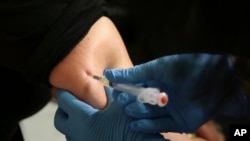The United States recorded 22 new measles cases last week, bringing the year's total number of cases to 1,044 in the worst outbreak of the disease since 1992, federal health officials said on Monday.
The U.S. Centers for Disease Control and Prevention said the number of cases of the highly contagious and sometimes deadly disease rose 2.2% in the week ended June 13 from the prior week. The 2019 outbreak, which has spread to 28 states, is the worst since 1992, when 2,126 cases were recorded.
Most of the new cases occurred in New York, with 13 occurring in Rockland County and eight in New York City, a CDC spokesman said.
Health experts say the virus has spread among school-age children whose parents declined to give them the measles-mumps-rubella vaccine, which confers immunity to the disease. A vocal fringe of U.S. parents, some in New York's ultra-Orthodox Jewish communities, cite concerns that the vaccine may cause autism, despite scientific studies that have debunked such claims.
The disease has mostly affected children who have not received the vaccine.
Measles was declared eliminated in the United States in 2000, meaning there was no continuous transmission of the disease for a year. Still, cases of the virus occur and spread via travelers coming from countries where measles is common.
CDC officials have warned that the country risks losing its measles elimination status if the ongoing outbreak, which began in October 2018 in New York, continues until October 2019. The outbreak has escalated since 82 people in 2018 and more than 40 people in 2019 brought measles to the United States from other countries, most frequently Ukraine, Israel and the Philippines, federal officials said.





